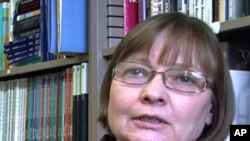The city of Tucson, in the southwest U.S. state of Arizona, is still reeling from the shooting Saturday that took the lives of six people, including a federal judge, and left several others badly wounded, including U.S. Congresswoman Gabrielle Giffords, who is being treated for a head wound at a local hospital. Some have used the incident to engage in politics, but most people are taking it as a time for reflection and mutual support.
The shooting that took place outside a grocery store Saturday has shaken Tucson to its core. Many people wonder how such a thing could have happened in this middle-class neighborhood in a city that is normally known more for its tranquility and its laid-back way of life.
For the most part, people here are taking time to reflect and to support those who were wounded or who lost loved ones.
There are vigils by day and by night, the most visited being the one outside the hospital where Congresswoman Gabrielle Giffords is being treated and the one outside her local office. But there have also been religious services and memorials for those who died, including a federal judge and a nine-year-old girl who was interested in politics, having recently been elected to her student council.
This tragedy has brought people together here looking to each other for solace and support. Local clergy and mental health workers have established venues and phone lines where people troubled by the shooting can seek counseling.
University of Arizona Government and Public Policy Professor Barbara Norrander says most people are putting politics aside for the moment.
"A lot of people volunteering, a lot of people going to the vigils, a lot of people just talking to one another about how, even if they did not vote for Giffords or did not like her positions, that they were very shocked and concerned about the shooting," said Barbara Norrander.
Politics have not been left totally to the side, however. Sheriff Clarence Dupnik, of Pima County where Tucson is located, blamed caustic political rhetoric for the shooting.
"The hate, the bigotry that goes on in this country is getting to be outrageous," said Sheriff Dupnik.
But other politicians have condemned the sheriff for trying to stifle rhetoric from people with whom he may disagree.
Many Arizonans have also spoken out against beginning such a political debate at this time of mourning.
An editorial in the Arizona Republic newspaper criticized Sheriff Dupnik for failing to control his emotions at a time when he should be dispassionately investigating the crime, noting there is no evidence that the accused shooter, Jared Loughner was influenced by political rhetoric.
National political commentators have also weighed into the issue. Liberal columnist Paul Krugman, who writes for The New York Times, says conservative politicians created a climate of anger that might have influenced a mentally unstable person like Loughner to act violently. But conservative columnist George Will rejects that contention as political opportunism "devoid of intellectual content" unsupported by data.
Barbara Norrander, who has followed Arizona politics for 20 years, says last year's midterm election did produce some vitriolic rhetoric from all sides.
"There were a lot of campaign ads that ran last year that were, perhaps, a little over the top in terms of their language and describing their opponents," she said.
But she says political analysts who complain about excessive rhetoric are being disingenuous.
"They used to talk about apathetic Americans and that people did not care about politics and were not paying attention and were not voting and now they are saying that people are too passionate," said Norrander.
At some point, Arizonans may focus anew on such issues as heated political rhetoric, gun rights and the need for programs to help the mentally ill. But most people here say such discussions can wait until after their grief has subsided.




